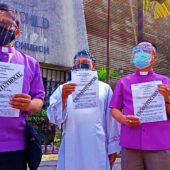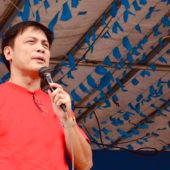Bishops of the Iglesia Filipina Independiente (IFI) condemned the red-tagging of the National Council of Churches in the Philippines (NCCP) after the Armed Forces of Philippines (AFP) and the Department of National Defense (DND) named the religious organization of being a “communist terrorist group.”
The NCCP, a group of 10 non-catholic Churches in the country, was among the 18 humanitarian and faith-based organizations declared by the AFP and DND as communist fronts during a congressional briefing on November 5.
The South-Central Luzon Bishops Conference (SCLBC) sees the military’s allegation a form of brazen political attack directed not only against the NCCP but to other religious institutions in the country which serve the poor, deprived and oppressed.
SCLBC chairperson Bishop Rowel Arevalo said the red-tagging of the NCCP bears serious implications for its member Churches.
“The government’s security institutions’ act of red-tagging the NCCP carries the malicious accusation that the Churches composing the ecumenical council have links as well with the communist movement in the country,” the bishop said.
“That is very impious and irreverent for the AFP and DND to disgrace the NCCP’s name with their irresponsible and immoral, fictitious and false accusations,” the bishop added.
NCCP said their inclusion in the list was an “attack on our Christian faith and tradition.”
“The NCCP vehemently condemns the malicious and careless tagging of the Armed Forces of the Philippine. We will remain resolute in our prophetic witness and service to the people even in the midst of shrinking democratic space and the rising impunity,” said NCCP in its official Facebook account.
The South-Central Luzon Bishops Conference believes that the military’s allegations and attacks against the ecumenical council is part of the intensifying crackdown against groups and organizations that are critical of the government.
NCCP is an outspoken critic of the human rights violations committed by President Rodrigo Duterte’s government and has been working with other faith-based communities and groups in the promotion of democracy and social transformation.


